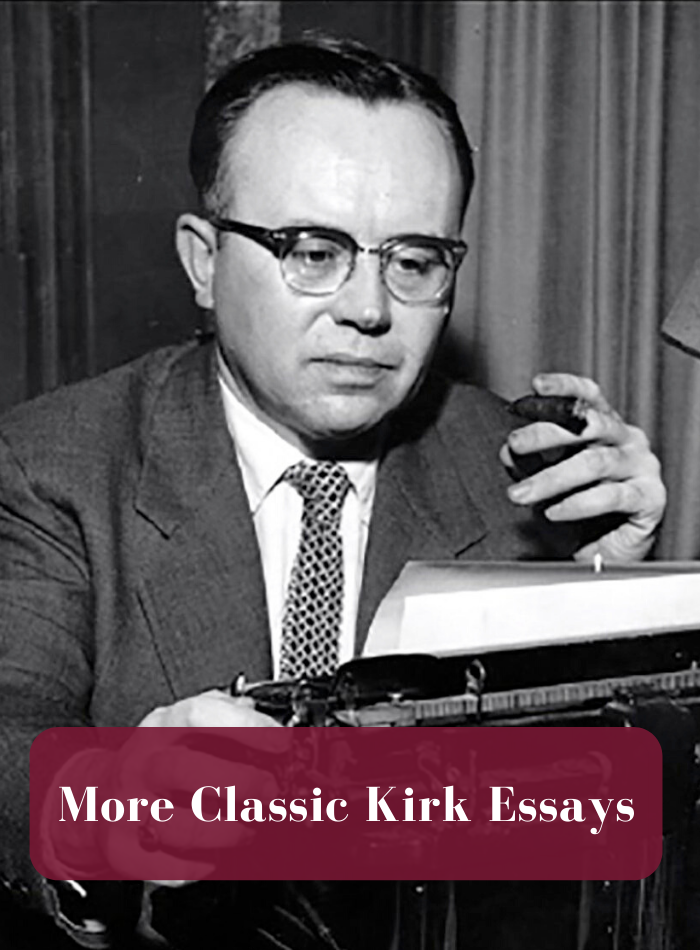Classic Kirk Essays
Renewing the Moral Order in American Society
An excerpt from Russell Kirk’s Symposium Address “A Conservative Perspective: Renewing the Moral Imagination” at the University of Missouri – Kansas City, in 1972.
Many voices have informed us that we live in the post-Christian era. Certainly we live in the post-liberal era. As a critic of society and of letters, I was invited to discuss today my own function in this confused and confusing America of ours. Let me offer you some ruminations, then, upon the possible renewal of moral imagination in our society. This phrase “the moral imagination” was first employed by Edmund Burke, and the most influential champion of the moral imagination in our century was T. S. Eliot. The moral imagination, clearly, is bound up with the body of sentiments and principles that we call “conservative.” My perspective is that of an adherent to what Eliot called “the permanent things.” Through renewal in this American society, we may yet rescue the permanence of being from the flux of becoming.
In our twentieth century, throughout most of the world, the liberals’ Benthamite doctrine of rational self-interest and the liberals’ Rousseauistic doctrine of human benevolence both have gone glimmering. It remains to be seen whether, within this century, the conservatives of imagination can contrive to restore the old motives to integrity and the moral order of civilization. The alternative to such a recovery appears to be not liberalism, nor socialism, but something grimmer.
One century after Thomas Babington Macaulay predicted the growth of a proletariat in American cities, what Arnold Toynbee calls the “internal proletariat ” began to act there quite as Macaulay had expected. Simultaneously, the “external proletariat,” embittered and impoverished dupes of ideology in Asia and Africa and eastern Europe and much of Latin America, began to threaten the seats of the mighty in Washington and the other capitals of the liberal order.
This challenge to the “permanent things,” to the great traditions of the civil social order, has become fiercer than it was in Burke’s day. Armed doctrines are more frightfully armed. The liberal era of complacency draws to its end; and if ever moral imagination and power of decision were required, the hour is now.
The twentieth-century American conservative is concerned, first of all, with the regeneration of spirit and character—with the perennial problem of the inner order of the soul, the recovery of the ethical understanding and the religious sanction upon which any life worth living is founded.
The conservative is concerned with the problem of leadership, which has two aspects: the preservation of some measure of reverence, discipline, order, and class; and the purgation of our system of education, so that learning once more may become liberal in the root sense of that word. Only just leadership can redeem society from the mastery of the ignoble elite.
The conservative is concerned with the phenomenon of the proletariat—which word does not signify the poor only. The mass of modern men must find status and hope within society: true family, links with the past, expectations for the future, duty as well as right, resources that matter more than the massamusement and mass-vices with which the modern proletarian (who may be affluent) seeks to forget his loss of an object.
This challenge to the “permanent things,” to the great traditions of the civil social order, has become fiercer than it was in Burke’s day. Armed doctrines are more frightfully armed. The liberal era of complacency draws to its end; and if ever moral imagination and power of decision were required, the hour is now.
The conservative is concerned with resistance to the armed doctrine, the clutch of ideology. He endeavors to restore the right reason of true political philosophy; he insists that although we cannot create the Terrestrial Paradise, we can make our own Terrestrial Hell through infatuation with ideology.*
The conservative is concerned with the recovery of true community: local energies and cooperation, with what Orestes Brownson called “territorial democracy,” voluntary endeavor, a social order distinguished by multiplicity and diversity. Free community is the alternative to compulsive collectivism. It is from the decay of community, particularly at the level of the “little platoon,” that crime and violence shoot up. In this realm, misguided “liberal” measures have worked mischief that may not be undone for decades or generations, here in America. Miscalled “urban renewal,” undertaken out of mixed humanitarian and profiteering motives has uprooted in most American cities whole classes and local communities, under dubious cover of federal statute; inordinate building of highways has had the same consequence. Urban rioting, the swift increase of major crimes, and the boredom that encourages addiction to narcotics are products of such foolish programs. In the phrase of Dr. Hannah Arendt, “the rootless are always violent.” So it is that the conservative talks of the need for roots in community, not of more measures of “mass welfare.”
And of course the conservative is concerned with a number of other primary questions, and with a vaster array of prudential questions, to which the answers must vary with the circumstances and the time.
My own function it is, as man of letters, journalist, and occasional dabbler in practical politics, to do what I can to wake the moral imagination in this twentieth-century society. Change is the means of our preservation; but without continuity, change is ruinous to us all. Old truths, the wisdom of the species, must be expressed afresh in every generation, and made relevant to present discontents.
To remind a people of the enduring truths of the moral imagination is not a lucrative undertaking; it may expose one to the slings and arrows of the ideologue; and one never knows how many are listening. But, as Henry Adams said, “the fun is in the process.”
Copyright © The Russell Kirk Legacy, LLC
* For Kirk’s extended definition of ideology, see Classic Kirk essay “The Drug of Ideology.”
